
The Macariini are a tribe of geometer moths in the subfamily Ennominae. Though they share many traits with the Sterrhinae, this is probably plesiomorphic rather than indicative of a close relationship, and DNA sequence data points to the Boarmiini as particularly close relatives of the Macariini. All things considered, this tribe might still resemble the first Ennominae more than any other living lineage in the subfamily.
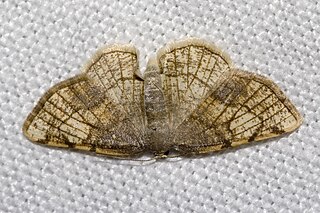
The Abraxini are a tribe of geometer moths in the subfamily Ennominae. Here, the Cassymini are considered a specialized offshoot of the Abraxini and merged therein; some authors consider them a distinct tribe however.

Ecliptopera is a genus of moths in the family Geometridae.
Eriplatymetra is a genus of moths in the family Geometridae erected by Augustus Radcliffe Grote in 1873.

Gandaritis is a genus of moths in the family Geometridae described by Frederic Moore in 1868.
Glaucina is a genus of moths in the family Geometridae erected by George Duryea Hulst in 1896.
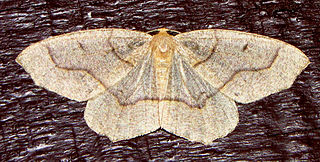
Lambdina is a genus of moths in the family Geometridae first described by Hahn William Capps in 1943.

Mellilla is a monotypic moth genus in the family Geometridae erected by Augustus Radcliffe Grote in 1873. Its only species, Mellilla xanthometata, the orangewing moth, was first described by Francis Walker in 1862. It is found in most of eastern North America.

Narraga is a genus of moths in the family Geometridae.
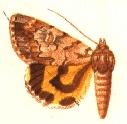
Catocala praeclara, the praeclara underwing, is a moth of the family Erebidae. The species was first described by Augustus Radcliffe Grote and Coleman Townsend Robinson in 1866. It is found in North America from Nova Scotia west to south-eastern Alberta, south to Florida and Kansas.

Drasteria pallescens, the cowhead arches, is a moth of the family Erebidae. The species was first described by Augustus Radcliffe Grote and Coleman Townsend Robinson in 1866. It is found in North America from Alberta and Saskatchewan south to Texas and Baja California.
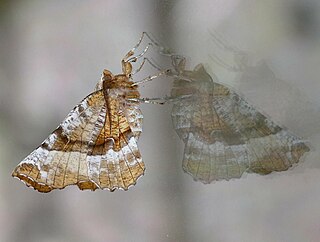
Selenia kentaria, commonly known as Kent's thorn or Kent's geometer, is a moth of the family Geometridae. The species was first described by Augustus Radcliffe Grote and Coleman Townsend Robinson in 1867. It is found in eastern and central North America.

Heliomata glarearia is a moth of the family Geometridae and subfamily Ennominae. The species was first described by Michael Denis and Ignaz Schiffermüller in 1775.

Heliomata cycladata, the common spring moth, is a moth of the family Geometridae. The species was first described by Augustus Radcliffe Grote and Coleman Townsend Robinson in 1866. It is found in eastern North America, with records from southern Ontario, southern Quebec, Maine, New Hampshire, Michigan, Wisconsin to South Carolina, Georgia, Alabama, northern Mississippi and Arkansas.
Trichodezia albofasciata is a moth in the family Geometridae. It is found in the United States.
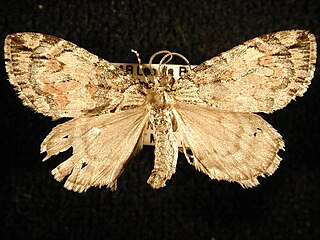
Hydriomena perfracta, the shattered hydriomena, is a species of geometrid moth in the family Geometridae. It is found in North America.

Thera otisi is a species of geometrid moth in the family Geometridae. It is found in North America.

Digrammia curvata, the shaded granite, is a species of geometrid moth in the family Geometridae. It is found in Central America and North America.
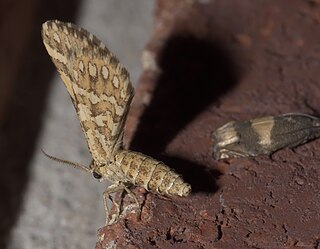
Fernaldella fimetaria, the green broomweed looper, is a species of geometrid moth in the family Geometridae. The species was first described by Grote and Robinson in 1870 It is found in Central and North America.
Heliomata infulata, the rare spring moth, is a species of geometrid moth in the family Geometridae. It is found in North America.















